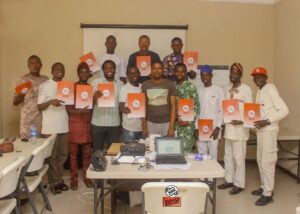Lithium processing factory to generate $26 Billion yearly in Nigeria – Abayomi Odunowo.
The Lithium Processing plant in Nasarawa, with a capacity of 3000 metric tonnes a day, is expected to be inaugurated in the first quarter of 2024. This facility is a significant development for the region, as it represents a major investment in the mining and processing of lithium, a critical component in the production of batteries for electric vehicles and renewable energy storage systems.
The plant is expected to create hundreds of jobs for the local community and will contribute to the economic development of the area. Additionally, it will establish Nasarawa as a hub for lithium processing, attracting further investment and business opportunities to the region.
Furthermore, the establishment of this processing plant will also aid in reducing Nigeria’s reliance on imported lithium, as it will be able to produce its own supply, strengthening the country’s position in the global lithium market.
Overall, the inauguration of the Lithium Processing plant in Nasarawa is a significant milestone for the region and the country as a whole. It represents a major step towards sustainable economic development and energy independence, and holds promise for a prosperous future for the region.
Nigeria, a country rich in solid mineral resources, has long been known for its raw material production. However, a recent project owned by Ganfeng Lithium Industry Limited marks a major breakthrough for the solid mineral sector as the administration seeks to ensure Nigeria moves from a raw material producing nation to one where value addition becomes a priority.
The project, which is a lithium-ion battery plant, is set to revolutionize the country’s economy by creating thousands of jobs and increasing the value of its solid mineral resources. This development comes at a critical time when the administration is seeking to diversify the economy and reduce its reliance on oil and gas.
The decision to establish the lithium-ion battery plant in Nigeria is a strategic one, as the country has significant lithium deposits that can be leveraged to meet the growing demand for lithium-ion batteries worldwide. With this plant, Nigeria will not only be able to tap into the global market for lithium-ion batteries, but it will also be able to add value to its solid mineral resources and contribute to the development of its manufacturing sector.
The impact of the new plant on the economy is expected to be profound. Firstly, it will create thousands of direct and indirect jobs for Nigerians, thereby reducing unemployment and poverty in the country. This will not only improve the standard of living for many Nigerians but also contribute to the overall economic growth of the country.
Furthermore, the establishment of the lithium-ion battery plant will attract foreign direct investment and stimulate the growth of other related industries such as mining, transportation, and logistics. This will create a multiplier effect on the economy and boost the country’s GDP.
In addition, the plant will also contribute to the development of the country’s manufacturing sector and help bridge the gap between the demand for lithium-ion batteries and its supply. This will position Nigeria as a key player in the global lithium-ion battery market and boost its export earnings. Moreover, it will reduce the country’s reliance on imported lithium-ion batteries and contribute to the development of a self-sufficient and sustainable energy ecosystem.
The decision to establish the lithium-ion battery plant in Nigeria is in line with the government’s efforts to promote value addition in the solid mineral sector. By adding value to its solid mineral resources, Nigeria will be able to maximize its potential and create a sustainable and diversified economy. This will also help the country reduce its vulnerability to fluctuations in global commodity prices and strengthen its resilience to external shocks.
Furthermore, the establishment of the lithium-ion battery plant will also contribute to the development of the country’s technological capability and innovation. This will further position Nigeria as a hub for research and development in the field of lithium-ion battery technology and contribute to the country’s long-term economic growth.
In conclusion, the establishment of the lithium-ion battery plant by Ganfeng Lithium Industry Limited marks a major breakthrough for the solid mineral sector in Nigeria. The project is expected to create thousands of jobs, stimulate economic growth, and position Nigeria as a key player in the global lithium-ion battery market. It also aligns with the government’s efforts to promote value addition in the solid mineral sector and move towards a sustainable and diversified economy. Overall, the establishment of the lithium-ion battery plant represents a significant step towards achieving the country’s economic development goals.
Otunba Abdulfalil Abayomi Odunowo
National Chairman AATSG
7th February, 2024.
Do you have any information or event for Epinews to publish or cover? Kindly Call us on +2349053535322 or send us message on Whatsapp number +2349053535322 or send us an email here










